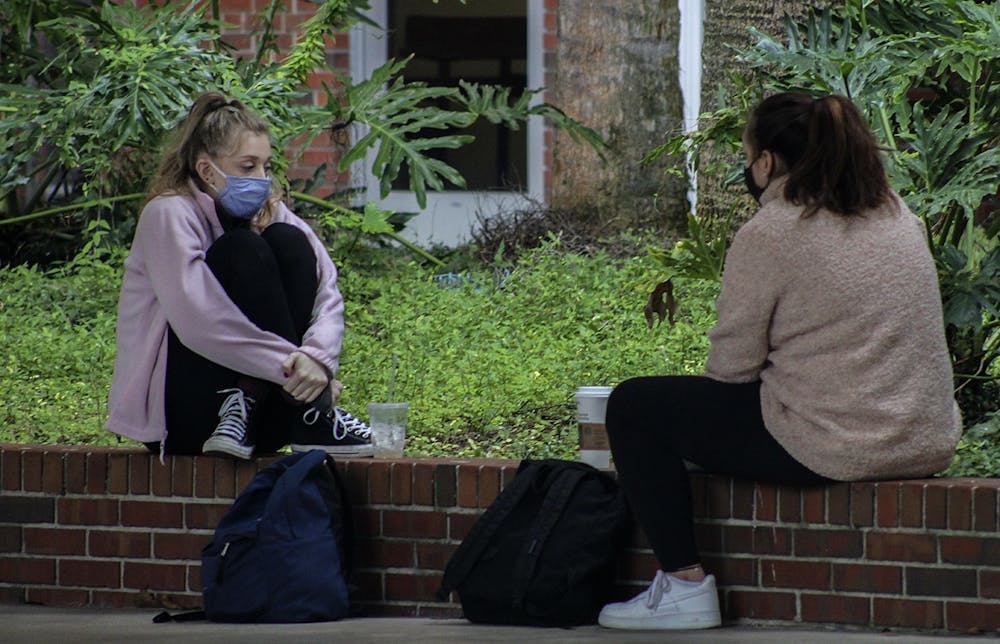UF is planning to loosen COVID-19 restrictions and return to full capacity classrooms as early as Summer B, with Summer A and C classes remaining mostly virtual.
Summer A and C classes will maintain many of the same COVID-19 policies seen during Spring and will serve as a transition period to in-person classes starting May 10. This time will allow staff and faculty to make necessary preparations for their classrooms and allow the UF community time to get vaccinated, UF spokesperson Cynthia Roldan wrote in an email.
Currently, it is expected that 80% of students and 90% of faculty at UF have been vaccinated, UF’s Director of Screen, Test & Protect Dr. Michael Lauzardo wrote in an April 28 COVID-19 update.
Summer B will see the lifting of social distancing policies and increased campus facility capacities, according to UF spokesperson Steve Orlando. Summer B classes will begin June 28.
Many courses will remain online during Summer A and C, with some classes being taught in-person with limited seating capacity or in HyFlex format — a course design that allows students to attend in-person while others engage remotely.
Summer B is expected to return to normal pre-pandemic classroom capacities, Orlando said. On-campus facilities like gyms and libraries are also expected to expand their capacity during the term.
The university expects to run summer athletic day camps throughout summer with the guidance of UF Health. Student athletes who are not vaccinated have to continue to follow SEC Medical Taskforce testing protocols.
“As we have throughout the pandemic, we continue to work UF Health, campus leadership and the SEC Medical Guidance Taskforce for guidance on protocols,” Senior Associate Athletics
Director Steve McClain wrote in an email.
With the return to 100% capacity in classrooms, students and faculty will also be able to pursue more research opportunities. Even so, programs like the P.K. Yonge Developmental Research School — a public school partnered with UF to develop innovations to improve the K-12 education — will adhere to state rules and regulations rather than university guidelines, Associate Dean at the College of Education Tom Dana, Ph.D. said.
“We are fully operational [at the College of Education], except for some of the research folks being unable to do the same level of work that they would have before [the pandemic], and that’s a problem,” Dana said.
Orlando said UF is currently discussing potential updates to its on-campus mask requirements, in light of recent updates to CDC guidelines regarding vaccinated people who no longer need to wear a mask in uncrowded outdoor areas. UF has not yet released any updates to its face covering requirements.
This is not the first time the UF administration has needed to revisit its COVID-19 policies in recent months.
In early April, UF updated its Campus Events and Gatherings Policy to include provisions about in-person events for the upcoming summer semester. The updates continued the maximum indoor capacity of 50 people and outdoor capacity of 250 people through Summer A. It also anticipated the reduction or elimination of social distancing requirements in Summer B.
The policy further outlined the expectation of an indoor face covering requirement through Fall semester, but the policy may be revised.
Lauzardo also outlined changes to UF Health policy surrounding routine COVID-19 testing in its April 13 COVID-19 update. After students report their first dose of the vaccine to the health screener on ONE.UF, they will be exempt from biweekly and return-to-campus COVID-19 testing.
UF does not plan to require vaccinations, despite over 100 US colleges and universities committing to placing requirements on students to be vaccinated.
“Only the state can make vaccine mandates,” Cynthia Roldan wrote in an email. “However, we are strongly encouraging all members of the UF community — students, faculty, and staff — to get vaccinated.”
Despite the updated COVID-19 guidelines for Summer, 19-year-old mathematics and statistics third-year Jude Flynn expressed concern in returning to campus for Summer B.
“I would rather not [return to full capacity in Summer B], but I also understand that there are a lot of logistical concerns that go into that decision,” Flynn said.
Contact Makiya Seminera at mseminera@alligator.org. Follow her on Twitter @makseminera.

Makiya Seminera is a UF international studies and Arabic senior, with a minor in mass communication. She's currently the editor-in-chief of The Alligator, but has previously served as university administration reporter, The Avenue editor, social media manager and opinion editor. She also serves as managing editor for Florida Political Review. Over summer, she interned with The State in Columbia, South Carolina, as a politics & government reporting intern.






